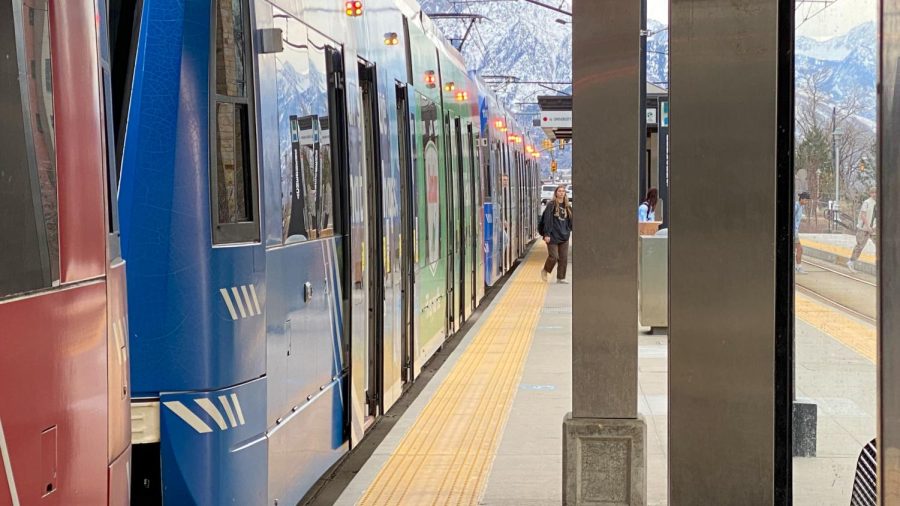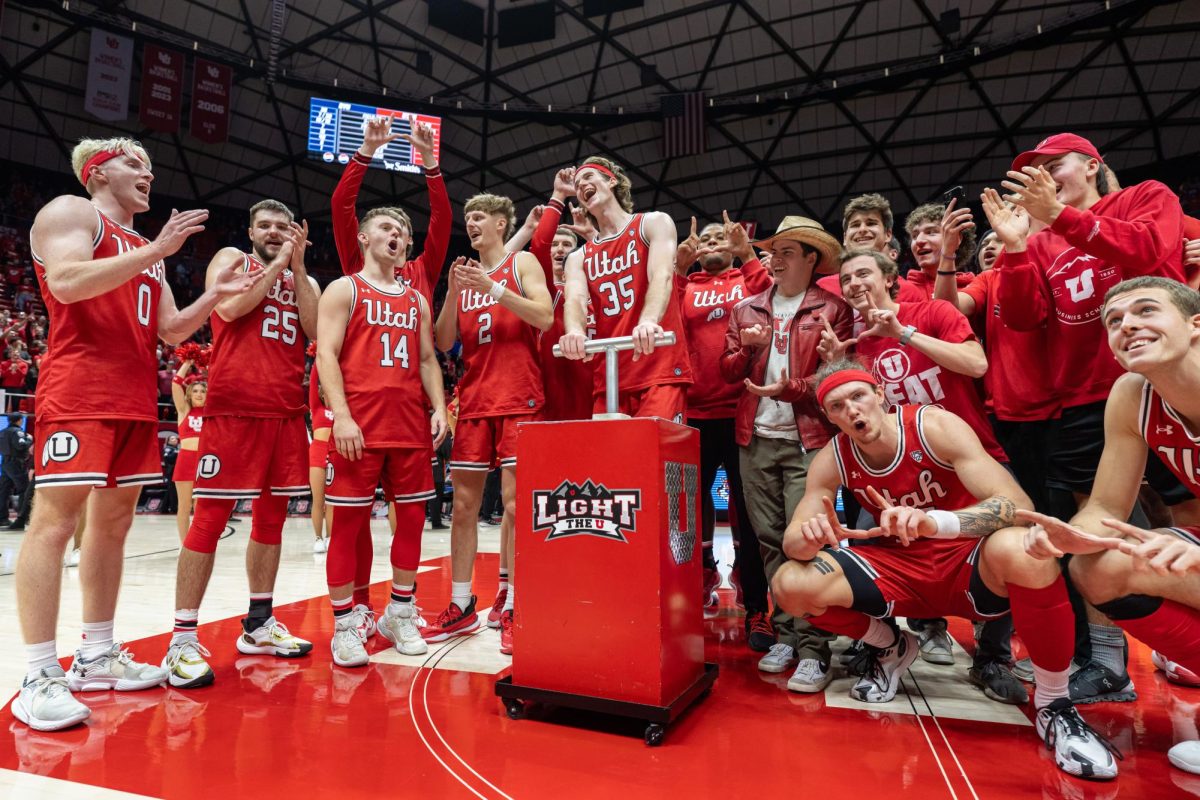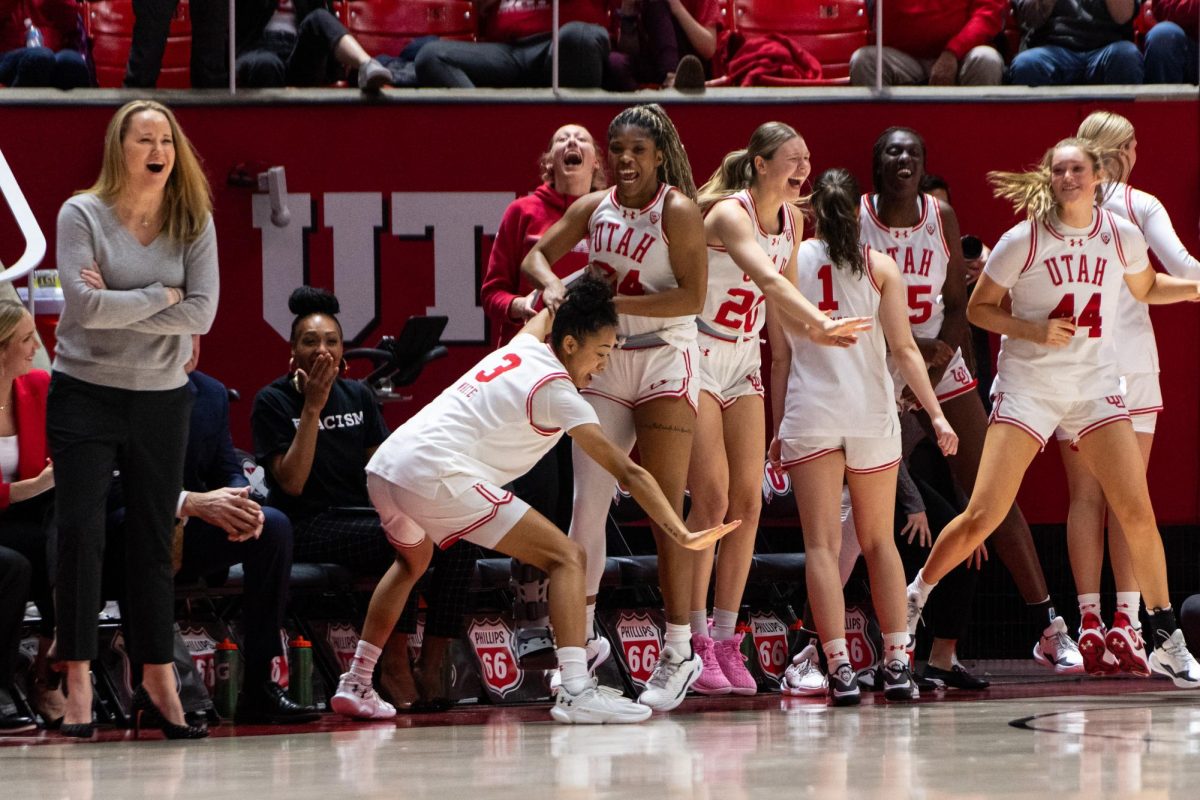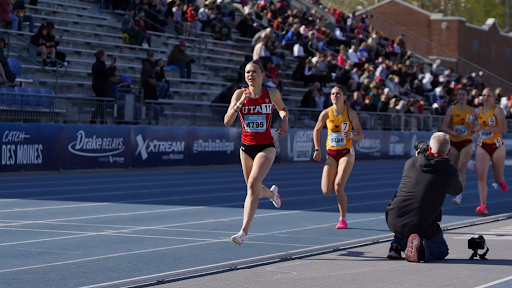UTA Holds Free Fare February, Sparks Conversation about Free Public Transportation
UTA TRAX passing through Fort Douglas station in Salt Lake City, on Monday, Feb. 14, 2022. (Photo by Jonathan Wang | The Daily Utah Chronicle)
February 26, 2022
During the month of February 2022, all UTA services are available for everyone to use free of cost for Free Fare February. This includes all UTA bus and rail services.
The initiative is led by Salt Lake City Mayor Erin Mendenhall and made possible by sponsors which include government agencies and local businesses.
Carl Arky, UTA spokesperson, says they are hoping more people will give public transportation a try while it is free. There are no extra steps needed to take advantage of the event – it’s as simple as hopping on.
“We’re hoping more people will try it and see because once they do it, they find out it’s really very easy,” Arky said.
Arky says that while the UTA has had free fare days in the past for several years, it has never been for more than a day or two at a time. Mendenhall approached the UTA about the idea, working together with the Chairman of the Board of Trustees to bring it to life.
Arky describes Mendenhall as an “advocate” for clean air, and cites cleaner air as the objective behind the month.
“Typically, January and February are the two worst months of the year [for air pollution],” Arky said. “Let’s encourage the use of public transportation so more and more people use that and let’s take more cars off the road, which means less pollution in the air, which means cleaner air.”
Although he says it is too early to draw any conclusions, Arky said that UTA keeps thorough tabs on statistics about ridership, and have already noted an initial increase in ridership at the start of the free fare event.
“We did see an initial about 15% spike in ridership for the first week of February, compared to the first week of January,” Arky said.
The event comes at a time when a bill introduced in the 2022 state legislative session would make the switch to free fare for public transportation permanent. HB 164, sponsored by Rep. Joel Briscoe, extends a prior bill he sponsored that removes fare on bad air quality days to encourage people to ride public transport in place of cars.
The Salt Lake representative estimated the cost for bringing the bill to reality between $30 to $50 million.
Arky says UTA is not taking a stance on the bill as an organization and will merely be providing information so that the legislature can make a decision. He says that fare from passengers makes up 15% of UTA’s budget.
“[Most of] the money to operate UTA comes from sales tax revenue, but about 15% comes from fare revenue, so that’s not insignificant,” Arky said. “When we do these free fare days, there has to be funding there to step in and replace the revenue that is lost.”
This replacement comes from willing government and business sponsors. The money that comes from fare is needed to help cover operational costs.
“No matter who pays for it, you’ve got to buy fuel, you’ve got to have people who are maintaining the vehicles, operating the vehicles, the support staff that backs them up,” Arky said.
Free fare is not a new concept for students and faculty at the University of Utah, who have long had access to free rides on UTA and TRAX through their Ucards.
Maggie Pozo, a first year biomedical engineering major at the U, says she often uses UTA buses to get around when she leaves campus. Pozo lives in student housing at Kahlert Village.
“I use the bus to go to the store, or if I need to go to my drum lessons…if I’m going home for like the weekend or just that afternoon,” Pozo said.
Pozo says the biggest draw for her using UTA is the convenience.
“I don’t have a car, and even then parking on campus I hear is really difficult, especially in housing when the parking is very limited,” Pozo said.
Having used UTA in high school, Pozo has noticed the financial difference made by the access that students have with their UIDs.
“I used to have to pay monthly for a pass, and it definitely was not cheap because I was using it to and from school and that adds up,” Pozo said. “Just knowing I don’t have to pay every time I have to go onto the bus does really help because then I don’t have to worry about adding costs over time.”
Jenny Nguyen, a first year psychology major at the U, is a commuter student who takes TRAX to get to campus for her in-person classes twice a week.
“I live really far away from campus and I don’t want to [drive] to and from school every day, so the TRAX is more convenient for me,” Nguyen said. “I can’t imagine paying like $2.50 every single day just to go to school … that’d be a really big inconvenience, and because I’m a college student, I don’t really have the money.”
Both Pozo and Nguyen said they’d support the bill in the legislature paying for free UTA fare for the general public.
“I think that’d be honestly, really amazing,” Pozo said. “My sister used to work at the U, so she got to use the bus for free and she commuted to work all the time. But now that she works downtown she has to pay for using the bus.”
Arky says the partnership between UTA and the U is a valuable one for all parties involved.
“It’s tremendously meaningful to UTA to have that kind of ridership … it’s heavily utilized by students and staff and administrative workers at the U to get up on campus,” Arky said. “It’s in the best interests of all concerned. It’s a good thing for UTA, it’s a good thing for the students, and it’s good for the U of U, they don’t have to build more parking lots or more roads.”










Mary Hogle • Feb 26, 2022 at 4:49 pm
Sleeping on the train and buses was really bad this month. Plus, most people refused to wear masks. If we enforce the masks and feet off the seats, then it may work but I didn’t feel comfortable with shopping. Carts full of belongings on the trax of at trax stations.
Free • Mar 30, 2022 at 5:11 pm
Agree. Homeless use the train ás a heated bedroom during free fare… I like the idea of free fare, but there are problems that would need to be solved.